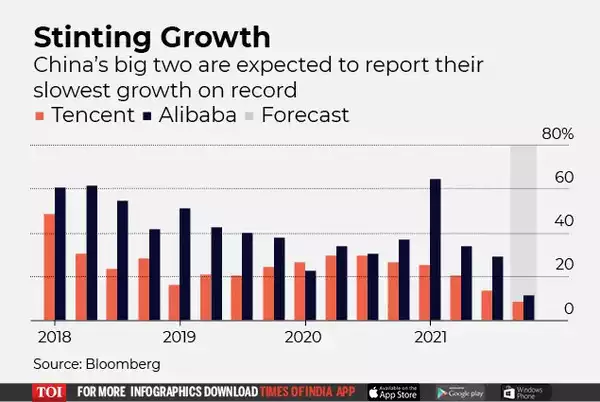TAMING BIG TECH
August 20, 2022 | Expert Insights

In his first visit to a private company, soon after taking power in late 2012, President Xi Jinping showered praises on Pony Ma, the founder of Tencent, for collecting data of millions of users and using it to drive innovation. The President had said that such data would benefit Beijing- a prophecy that seems to be coming true now.
After having been pommelled over the last year for various alleged infractions, Chinese Big Tech is on its knees. According to official Chinese documents, the government is now making demands for free access to their data pool on big tech companies such as Tencent and online retail giant Alibaba Group Holding Ltd. TikTok owner ByteDance has been forced to invest in social media, e-commerce and other businesses. According to data published and gleaned from interviews with corporate policymakers, the rule is part of Beijing's broader regulatory crackdown on the once untouched technology sector.
Background
Over the years, the government has frequently required information from private companies and occasionally had the power to enforce its demands, particularly for finding criminal suspects and putting an end to dissent. Prior attempts to centralise Chinese enterprises' statistics, including those on consumer borrowing patterns and payment histories, have been met with resistance. According to Beijing's internal discussions, key officials throughout the years, including Premier Li Keqiang, have occasionally lobbied for granting the private sector more authority in gathering and handling user data. The goal was to motivate businesses to innovate continuously and to accommodate their growth, including global expansion. According to state media reports, "with the most sufficient data, we can do the most objective and accurate analysis," Premier Li Keqiang had told Mr Ma. "Proposals to the government on this point are of great value."

Analysis
In the long run, this move is ultimately about control. China has the biggest base of internet users in the world and is a market ripe for picking – for everything ranging from gaming and e-commerce to the smartphone industry. Tech companies based in China have grown exponentially over the years.
Beijing is furiously defensive of the innovation behind these giant tech companies and does not permit the trade of it past its shores. China is mainly concerned with how such platforms can be leveraged to impact public opinion within the country.
Beijing has encouraged benefit suppliers to guarantee that algorithms "effectively spread only positivity" and are not utilised for futile exercises and over-the-top investments. It is a fact that a vast amount of personal data is being collected by the country's technology companies. International brands like Google and Facebook have been under duress to submit data over concerns about how they utilise information and create content for their users.
Assessment
- Algorithms determine what is presented to the user and in what order. This is important for the growth of social media platforms. But, if used strategically, targeted advertising and restrictions can change the way a nation thinks.
- This move could trigger a series of events that could potentially lead to a reduction in user data privacy and a potential pull-out of big tech companies owing to China's stringent digital laws.
- Beijing has a long history of tightening security prior to important events in the country. About as momentous as it gets will be this year's party congress, where Xi Jinping is predicted to win a historic third term. The tightening of screws over the Chinese Big Tech is being seen as signalling to potential opponents of President Xi, who are reportedly supported by Big Tech funding. The situation may ease out after the party congress, and President Xi Jinping is safely ensconced in his third term.








Comments